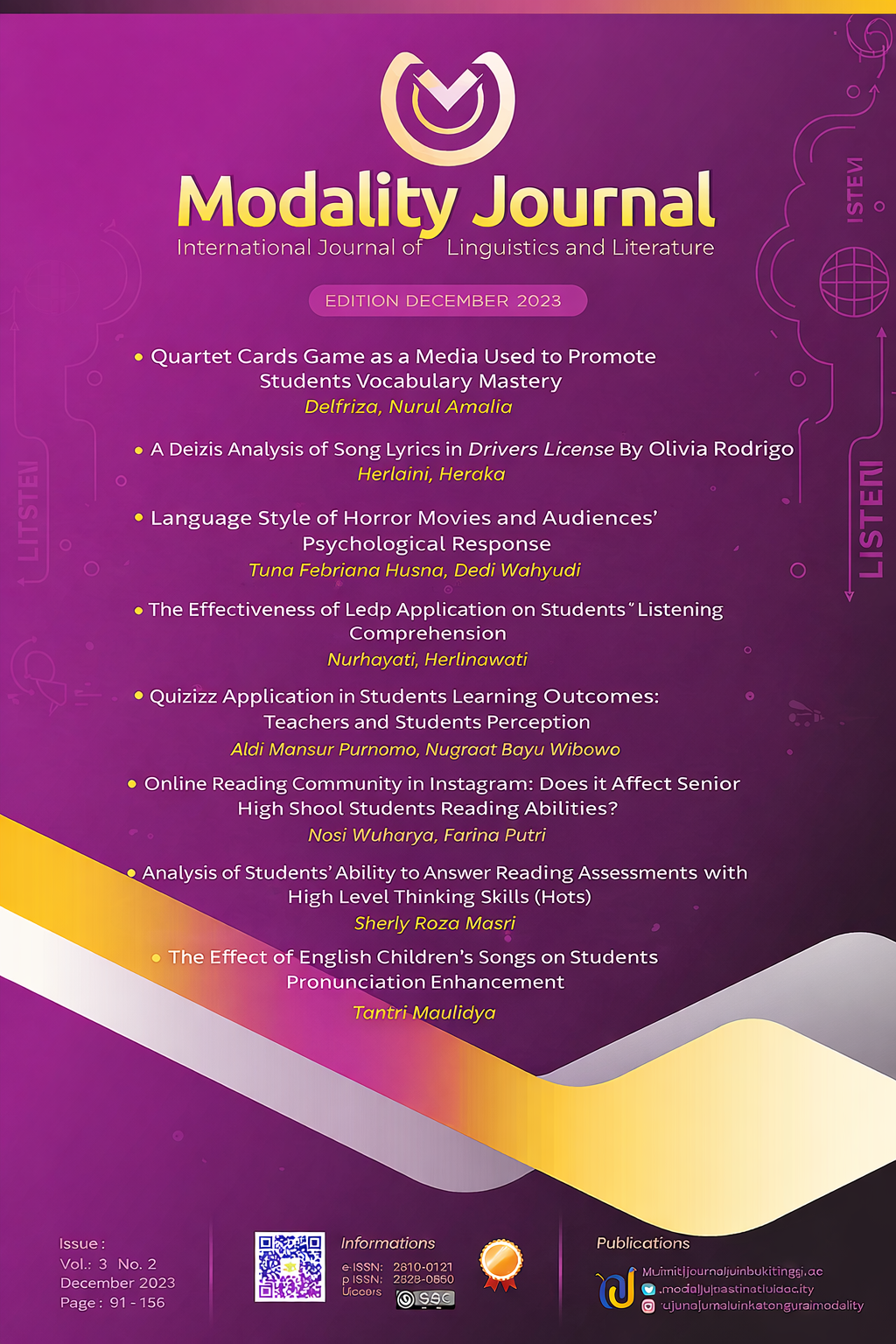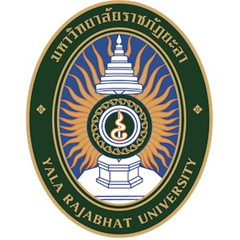Quartet Cards Game as a Media Used to Promote Students Vocabulary Mastery
DOI:
https://doi.org/10.30983/mj.v3i2.6808Keywords:
teaching aids, learning media, quartet cards game, vocabulary masteryAbstract
This research had the objective of measuring whether or not Quartet cards game used as attractive media effective to promote 7th grade students' vocabulary mastery. This quantitative research applied experimental approach with one group pre-test and post-test design. There were 28 students of 7th grade, registered in even semester of academic year 2022/2023, participated as sample in this study. The tools used in collecting the data were validated pre-test and post-test of vocabulary knowledge. In analyzing the data, paired-sample test was used to determine the correlations between variables and to decide which hypothesis was accepted. Initial data calculation revealed that in the average, the students reached higher achievement in the post test than in the pre-test in which the mean score gained in the post-test was 77.71 while in the pre-test was 55.96 which meant that vocabulary mastery of the students was 21.95 points increased after they were taught by using Quartet cards game. Besides, the statistical analysis indicated that the correlation coefficient between two variables was 0.678 with the sig value of 0.001 or < than a probability of 0.05, this confirmed that there was a relationship between pre-test and post-test variables.  The computation of paired-sample test revealed that Sig. (one-sided and two-sided p) was <0.001 which showed that there was different achievement reached by the students after Quartet cards game was used in the learning. Based on these findings, this research concluded that Quartet cards game promoted 7th graders’ vocabulary mastery. Thus, this study accepted Ha and rejected H0.
Keywords: teaching aids, learning media, quartet cards game, vocabulary mastery
Abstrak
Penelitian ini memiliki tujuan untuk mengukur apakah Quartet cards game yang digunakan sebagai media yang atraktif efektif dalam meningkatkan penguasaan kosakata siswa kelas 7. Penelitian kuantitatif ini menerapkan pendekatan eksperimen dengan disain ‘one group pre-test post-test’. Sejumlah 28 siswa kelas 7 MTs Darussalam, Tangerang Selatan, terdaftar pada semester genap tahun ajaran 2022/2023, berpartisipasi sebagai sampel dalam penelitian ini. Alat yang digunakan dalam mengumpulkan data adalah uji pengetahuan kosa kata sebelum dan sesudah (pre-test dan post-test) yang telah divalidasi. Dalam menganalisis data, paired sample test digunakan untuk menentukan korelasi antar variabel dan untuk menentukan hipotesis mana yang diterima. Kalkulasi data diawal menunjukkan bahwa secara rerata, siswa mencapai hasil yang lebih tinggi pada post-test dibandingkan capaian mereka di pre-test, dimana nilai rerata di post-test adalah 77.71 sedangkan pada pre-test adalah 55.96 dimana hal ini menunjukkan bahwa penguasaan kosa kata siswa meningkat sebesar 21.95 poin setelah mereka diajarkan dengan menggunakan media Quartet cards game. Selain itu, analisis statistika menunjukkan korelasi koefisien antar variabel adalah 0.678 dengan nilai signifikan 0.001 atau lebih kecil (<) dari kemungkinan 0.05, dan hal ini mengkonfirmasi bahwa terdapat korelasi antara variabel pre-test dan post-test. Perhitungan dari paired-sample test menunjukkan bahwa Signifikan (one-sided dab two-sided p) lebih kecil dari 0.001 (<0.001) yang menunjukkan bahwa terdapat perbedaan capaian yang diraih oleh siswa setelah Quartet cards game digunakan dalam pembelajaran. Berdasarkan temuan ini maka disimpulkan bahwa Quartet cards game meningkatkan penguasaan kosa kata siswa kelas 7. Dengan demikian, ma.ka penelitian ini menerima Ha dan menolak H0.
References
Alqahtani, M. (2015). The importance of vocabulary in language learning and how to be taught. International Journal of Teaching and Education, 3(3), 21-36. DOI: https://doi.org/10.20472/TE.2015.3.3.002.
Annisa, L.I. & Rohani. (2015). Developing quartet card games for teaching vocabulary (A case of the Eighth-Grade students of SMP Islam Al-Madina Semarang in the academic year of 2014/2015). Journal of English Language Teaching, 4(1), 1-7.
Astuti, Y.D., et.al., (2021). The effectiveness of quartet card game in teaching writing descriptive texts to senior high school students in Batu Ampar. ICOLED: 1st International Conference on Literacy and Education, 13-21. Pontianak.
Ayriza, Y. et.al. (2021). The effectiveness of quartet card game in increasing career knowledge in lower grade elementary school students. Current Psychology, 1-12. DOI: https://doi.org/10.1007/s12144-021-01687-7.
Budiman, P.G., Sada, C. & Wardah (2018). Improving students’ vocabulary by using comics strips in teaching narrative text. Jurnal Pendidikan dan Pembelajaran Khatulistiwa, 7(9), 1-8.
Creswell, J.W. (2014). Research design: qualitative, quantitative, and mixed-method. Singapore: SAGE Publication, Ltd.
Crook, A. (2023). Quartett. Game Rules, retrieved from: https://gamerules.com/rules/quartett/, on Dec 28, 2023.
Elviza, Y. & Ratmanida (2019). The use of quartet cards game to develop junior high school students’ interest English speaking. Journal of English Language Teaching, 8(1), 146-152.
Gozcu, E. & Caganaga, C.K. (2016). The importance of using games in EFL classrooms. Cypriot Journal of Educational Science, 11(3), 126-135.
Misa, M. (2022). Teaching vocabulary using games: a case study of ELT classroom at 7th grade students of secondary school. Budapest International Research and Critics Institute-Journal (BIRCI-Journal), 5(2), 17748-17757.
StojkoviHÌ‚, M.K & JerotijeviHÌ‚, D.M. (2011). Reasons for using or avoiding games in an EFL classroom. 1st International Conference on Foreign Language Teaching and Applied Linguistics, May 5-7, Sarajevo, 940-947.
Tuan, L.T. (2012). Vocabulary recollection through games. Theory and Practice in Language Studies, 2(2), 257-264.
Permatasari, et.al. (2023). The effectiveness of quartet card game on students’ speaking ability of junior high school. Conference on English Language Teaching, 21-33. Retrieved from: https://proceedings.uinsaizu.ac.id.
Phung, T.T.H. (2021). A study on the techniques of presenting vocabulary to increase students’ motivation. Journal of English Language Teaching and Applied Linguistics, 3(5), 45-54. DOI: https://doi.org/10.32996/jeltal.2021.3.5.5.
Qureshi, A.W., et.al. (2023). Significance of vocabulary learning for EFL learners: a review. Journal of Namibian Studies, 33 S1, 1847-1863.
Quy, P.H. (2019). Cooperative game-playing in the EFL classroom. English Teaching Forum, 14-23. accessed from: americanenglish.state.gov/English-teaching-forum, on: July 21, 2023.
Santoso, D.A.A., (2019). Teaching speaking by using quartet card game at SPMN 275, East Jakarta. DEIKSIS, 11(01), 28-38.
Stratton, SJ. (2019). Quasi-experimental design (pre-test and post-test studies). Prehospital and Disaster Research, 34(6), 573-574.
Warni (2019). Improving students’ vocabulary by using quartet card game at the seventh grade of SMPN 10 Palopo. (Unpublished thesis). State Islamic Institute of Palopo.
Zaitun, Z., Hadi, M.S., & Zulfiana, R. (2021). The correlation between students’ achievement in vocabulary and speaking ability at grade 8 junior high school students. BISMA Journal of Counseling, 5(2), 147-155.
Zirawaga, V.S., Olusanya, A.I., & Maduku, T. (2017). Gaming in education: using games as a support tool to teach history. Journal of Education and Practice, 8(15), 55-64.
Downloads
Published
How to Cite
Issue
Section
Citation Check
License
Copyright (c) 2023 Rina Septria Meidy, Zaitun Zaitun

This work is licensed under a Creative Commons Attribution-ShareAlike 4.0 International License.
Authors who publish with this journal agree to the following terms:
- Authors retain copyright and grant the journal right of first publication with the work simultaneously licensed under a Creative Commons Attribution License that allows others to share the work with an acknowledgment of the work's authorship and initial publication in this journal.
- Authors are able to enter into separate, additional contractual arrangements for the non-exclusive distribution of the journal's published version of the work (e.g., post it to an institutional repository or publish it in a book), with an acknowledgment of its initial publication in this journal.
- Authors are permitted and encouraged to post their work online (e.g., in institutional repositories or on their website) prior to and during the submission process, as it can lead to productive exchanges, as well as earlier and greater citation of published work (See The Effect of Open Access).




